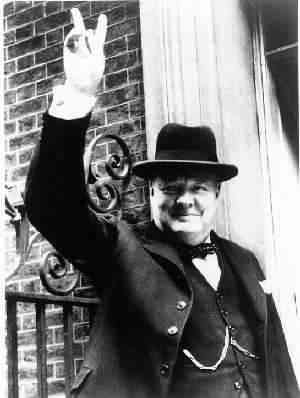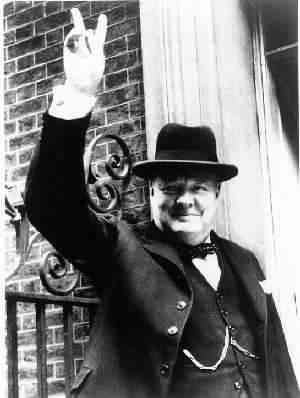
Churchill in the News
Being Winston Churchill

December 18, 2010
Inside the mind and worldview of the man who saved Britain.
By Michael Makovsky
THE NEW REPUBLIC, December 8, 2010 -Seventy years ago, in the summer and fall of 1940, Western civilization teetered in the balance as Britain stood alone against Nazi-controlled Europe. Other major world powers did not lend aid; Russia supported Germany, and the United States remained neutral. After Britain resisted the assault of Nazi bombers, in what was dubbed  the “Battle of Britain,” the country was saved and German momentum stymied. The whole course of the war then radically shifted. Germany turned east and attacked the Soviet Union in June 1941 and then declared war on the United States in December 1941, sealing its ultimate defeat.
the “Battle of Britain,” the country was saved and German momentum stymied. The whole course of the war then radically shifted. Germany turned east and attacked the Soviet Union in June 1941 and then declared war on the United States in December 1941, sealing its ultimate defeat.
It was Winston Churchill who, upon becoming prime minister in May 1940, fortified the British people against the German assault. Churchill’s role has become the stuff of legend. Less well understood is how he came to lead his nation at that crucial moment. For decades, his judgment, integrity, and credibility had been questioned, if not disdained. But it was the very essence of his character-his eclectic but distinctive worldview and his dedication to the advance of civilization-along with his ample rhetorical and leadership skills, that led him to shape history at such a pivotal moment.

2024 International Churchill Conference
Although Churchill is perceived by Americans as a man of great principles and constancy, many in England claimed that he was quite the opposite-mercurial, devoid of a core character, a political opportunist with poor judgment. As one journalist wrote in 1916, “It is the ultimate Churchill that escapes us”; he was a “soldier of fortune” who “loves the fight more than the cause.” Churchill fed that perception with his frequent political shifting: switching from the Conservatives to the Liberals in 1904 and then back to the Conservatives for good in 1924. The Socialist dramatist George Bernard Shaw once wrote Churchill about the opposition of the unimaginative reactionaries: “You [are] a phenomenon that the Blimps and Philistines and Stick-in-the-muds have never understood and always dreaded.”
Read the entire article here at The New Republic
©The New Republic
Subscribe
WANT MORE?
Get the Churchill Bulletin delivered to your inbox once a month.


